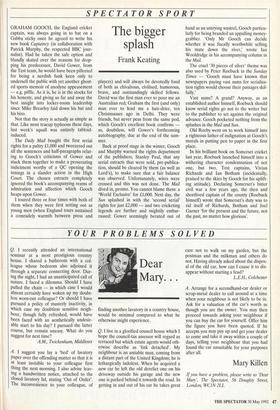SPECTATOR SPORT
The bigger splash
Frank Keating
GRAHAM GOOCH, the England cricket captain, was always going in to bat on a Gabba sticky once he agreed to write his new book Captaincy (in collaboration with Patrick Murphy, the respected BBC jour- nalist). Had he taken the safe option and blandly skated over the reasons for drop- ping his predecessor, David Gower, from the Test team, he would have been pilloried for being a nerdish funk keen only to undersell the public with yet another ghost- ed sports memoir of anodyne appeasement — e.g. piffle. As it is, he is in the stocks for his honesty, and giving us far and away the best insight into locker-room leadership since Mike Brearley laid down his bat and his biro.
Not that the story is actually as simple as that. Like most teacup typhoons these days, last week's squall was entirely tabloid- induced.
The Daily Mail bought the first serial rights for a paltry £1,000 and tweezered out all the sentences and half-paragraphs relat- ing to Gooch's criticisms of Gower and stuck them together to make a prosecuting indictment worthy of a QC opening the innings in a slander action in the High Court. The chosen extracts completely ignored the book's accompanying reams of admiration and affection which Gooch heaps upon Gower.
I toured three or four times with both of them when they were first setting out as young men (when England tours sustained a comradely warmth between press and players) and will always be devotedly fond of both as chivalrous, civilised, humorous, brave, and outstandingly skilled fellows. David was the first man ever to pour me an Australian red; Graham the first (and only) man ever to lend me a hair-drier, ten Christmasses ago in Delhi. They were friends, but never peas from the same pod, which Gooch's excellent book confirms as, doubtless, will Gower's forthcoming autobiography, due at the end of the sum- mer.
Back at proof stage in the winter, Gooch and Murphy warned the rights department of the publishers, Stanley Paul, that any serial extracts that were sold, pre-publica- tion, should be cleared by them (as well as Lord's), to make sure that a fair balance was observed. Unfortunately, wires were crossed and this was not done. The Mail dived in, pronto. You cannot blame them: a `World Exclusive' for £1,000. Next day, the Sun splashed in with the 'second serial' rights for just £2,000 — and two cricketing legends are further and mightily embar- rassed: Gower seemingly berated out of hand as an untrying wastrel, Gooch particu- larly for being branded an appalling money- grabber. 'Only Mr Gooch can decide whether it was fiscally worthwhile selling his mate down the river,' wrote Ian Wooldridge in his accompanying column in the Mail.
The cruel '30 pieces of silver' theme was also used by Peter Roebuck in the Sunday Times — 'Gooch must have known that newspapers paying vast sums for serialisa- tion rights would choose their passages skil- fully.'
Vast sums? A grand? Anyway, as an established author himself, Roebuck should know serial rights go not to the writer but to the publisher to set against the original advance. Gooch pocketed nothing from the splashes in the Mail and Sun.
Old Roeby went on to work himself into a righteous lather of indignation at Gooch's morals in putting pen to paper in the first place.
In his brilliant book on Somerset cricket last year, Roebuck launched himself into a withering character condemnation of not one, but two, Test captains, Vivian Richards and Ian Botham (incidentally, praised to the skies by Gooch for his uplift- ing attitude). Declaring Somerset's bitter civil war a few years ago, the then and shortlived captain of the county (Roebuck himself) wrote that Somerset's duty was to rid itself of Richards, Botham and Joel Garner 'for the present and the future, not the past, no matter how glorious'.
















































 Previous page
Previous page